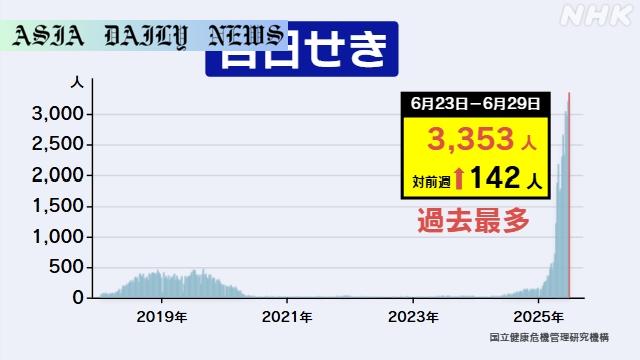Whooping cough sees record-breaking weekly cases in Japan, with 3,353 infections reported countrywide in late June.
- Weekly whooping cough cases in Japan reached a record-breaking high of 3,353 in late June.
- A total of 39,672 cases have been reported across Japan this year, with Tokyo and Saitama heavily affected.
- Infants aged less than six months are particularly vulnerable, with fatalities reported involving drug-resistant strains.
- Japan Pediatric Society strongly advises vaccinating infants starting at two months of age.

A Record Surge in Whooping Cough Cases in Japan
Japan is currently witnessing an alarming rise in cases of whooping cough, also known as pertussis, with weekly numbers reaching unprecedented levels. According to the Japan Institute for Health Security, medical institutions across the country reported 3,353 cases in the last week of June alone. This marks the highest count observed since the country started maintaining official records in 2018 and highlights an urgent public health challenge.
As of June 29, the total number of reported cases in 2023 stands at an astonishing 39,672. Certain densely populated areas, including Tokyo with 234 cases and Saitama with 229 cases, have been particularly hard-hit. Other affected regions include Kanagawa, Ibaraki, and Niigata. These figures underscore the widespread nature of this outbreak and the increasing need for robust prevention and mitigation strategies.
The Risks to Infants and Vulnerability to Drug Resistance
Whooping cough primarily affects the respiratory system, leading to severe coughing fits that can be life-threatening in cases involving infants under six months. Tragically, recent reports confirm that four infants aged between less than one month and four months have lost their lives to this disease by June’s end. Additional reports suggest growing concerns over drug-resistant strains of the pertussis-causing bacteria, further complicating treatment efforts and heightening the crisis.
The disease often spreads rapidly in close communities, particularly where vaccination coverage is low or delayed. Infants, not fully vaccinated within their first few months of life, remain the most vulnerable group. Early diagnosis and treatment are critical, but the increasing prevalence of drug resistance may render some conventional therapies less effective.
Call for Vaccination: An Essential Measure
In light of this public health emergency, the Japan Pediatric Society has issued a nationwide call urging parents to prioritize vaccinations for their infants. Vaccination against whooping cough is typically initiated at two months of age, with booster doses following at regular intervals. Early immunization offers the most effective line of defense against this disease and can prevent severe complications and fatalities.
Furthermore, public health authorities are promoting awareness campaigns to educate communities about the importance of timely vaccinations. Parents are encouraged to adhere strictly to vaccination schedules and seek medical advice immediately if their children exhibit any early symptoms of whooping cough, such as uncontrollable coughing or difficulty breathing.
The Road Ahead: Mitigating the Impact
Despite advancements in vaccination programs and medical treatments, the current outbreak underscores the necessity of continuous monitoring and adaptation to evolving strains of infectious diseases. The medical community must also address the growing concern about drug-resistant bacteria, working collaboratively to develop more effective antibiotics and treatment protocols.
Additionally, public healthcare systems should ramp up community health initiatives, including regular check-ups, vaccination drives, and public education seminars. Long-term commitments to disease surveillance and research can aid in preventing future outbreaks and reducing mortality rates associated with preventable illnesses such as whooping cough.



Commentary
The Seriousness of the Whooping Cough Outbreak
The recent surge in whooping cough cases in Japan is not just a statistical anomaly; it is a pressing public health issue that demands immediate attention. The sharp increase in cases, combined with the geographical spread and reports of fatalities, paints a grim picture. Particularly worrisome are the fatalities among infants and the emergence of drug-resistant strains, which pose a significant challenge to healthcare providers.
Community Efforts and Responsibility
Vaccination remains the most potent tool against whooping cough, yet its success heavily depends on community adherence. Parents play a critical role in ensuring their children are vaccinated on schedule, but public health institutions also bear responsibility in making vaccines accessible to all, particularly in rural or underserved areas. Outreach programs and educational campaigns can help combat vaccine hesitancy and ensure communities are better prepared to curtail outbreaks.
Lessons for Global Health Systems
Japan’s experience holds important lessons for other nations as well. The outbreak underscores the importance of maintaining robust vaccination programs and the need for global vigilance against emerging drug-resistant pathogens. Countries must prioritize investments in medical research, healthcare infrastructure, and international cooperation to counter the growing threat of infectious diseases effectively.
Ultimately, the rise in whooping cough cases in Japan serves as a stark reminder of the fragility of public health systems in the face of persistent and evolving health threats. It is a sobering call to action—for governments, healthcare providers, and individuals alike—to prioritize disease prevention and ensure that no child succumbs to a preventable illness.